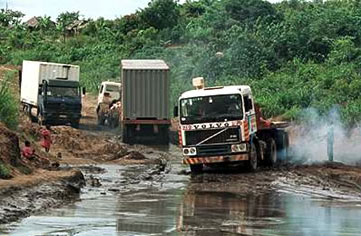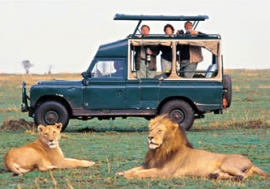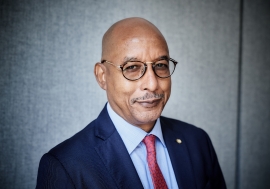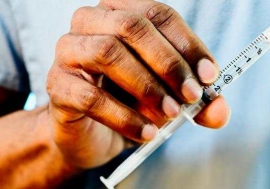Highways link 15 West African countries
Highways link 15 West African countries
It is another busy day at Doxa Worldwide Movers, a freight company in Accra, Ghana. The general manager, Matthew Ackun, runs through final delivery orders. Two trucks, heavy with furniture, utensils and clothes, begin their 380-kilometre trek to Lagos, Nigeria. Three border crossings away, a relocating family expects its belongings to arrive on schedule.
 Better roads could greatly ease travel and trade between African countries.
Better roads could greatly ease travel and trade between African countries.“The trucks will be there in only eight hours,” Mr. Ackun says with confidence. While it is hardly a record-breaking time, it marks a vast improvement over conditions just a year ago. “The roads were so narrow they fit only two cars at a time — one coming, one going. Our drivers used to take the whole day to negotiate all the potholes, tricky corners and endless checkpoints from here to Nigeria.” The roads are now better paved, he says, and in most urban areas the highway has double lanes. “We deliver three times faster.”
The quicker trip is a result of continuing efforts by West African leaders to complete a 15-nation, 4,560-kilometre trans-West African coastal highway from Nouakchott, Mauritania, to Lagos, Nigeria. NEPAD, the New Partnership for Africa’s Development, gave West African countries an impetus to complete this unifying highway. The vision, developed by Africans for Africa, emphasizes the need to develop better transportation to boost economic links and local trade.
Trade among African countries accounts for only about 10 per cent of their total external trade, the lowest level of any world region. The problem, according to the UN Economic Commission for Africa, is that the continent’s railways and roads often lead towards the ports rather than linking countries across regions.
A constant frustration
Poor road infrastructure is a constant source of frustration for Doxa Worldwide Movers when it transports goods from Côte d’Ivoire, Togo, Benin, Nigeria and other points all the way to Niger. “It’s the nature of the job,” Mr. Ackun says.
Business has grown since the company’s birth 10 years ago, but so have the headaches. Mr. Ackun told Africa Renewal that to get to Liberia, containers often have to go to sorting hubs in Europe first, and then retrace their way back to Africa. Social unrest, little competition, poor roads and multiple checkpoints, he says, are partly responsible for the steep cost of moving goods within the region.
“It costs $1,000 to ship a 20-foot container to the United Kingdom,” Mr. Ackun said. “You need $2,300 to transport the same container just next door to Liberia. By road, our drivers can be stopped five times in Ghana, six times in Togo, six times in Benin and easily 20 times within Nigeria alone. Sometimes for good reason, to protect against highway robberies, but some officials can be abusive.” He added that he now has renewed hope that conditions could get better because of NEPAD’s efforts to improve roads and border regulations.
“The Ghanaian government has been doing a lot to improve roads. It’s gradual, but we are getting somewhere. I’d say, over the last four years, they completed about 60 per cent, maybe more, of the Ghana side of the highway. This is good for business.”
West Africa has completed more than 83 per cent, or 3,777 kilometres, of the coastal highway, according to the Economic Community of West African States (ECOWAS). The community is building the highways, some of the most ambitious construction projects in the region, under the auspices of NEPAD. The bulk of the remaining work is in sections that link to Liberia, Côte d’Ivoire and Sierra Leone. Years of conflict destroyed much of the infrastructure in those countries and they are barely starting to recover. The other ECOWAS countries are Benin, Burkina Faso, Cape Verde, Gambia, Ghana, Guinea, Guinea-Bissau, Mali, Niger, Nigeria, Senegal and Togo.
Promoting trade
“This highway should boost economic activities by a large margin, especially trade, because it will allow people and goods to easily get to local and regional markets,” says Ini Urua, who heads NEPAD efforts at the African Development Bank (ADB). “This is the NEPAD vision — to remove barriers between African countries,” he told Africa Renewal. Unreliable and costly transport services hamper the growth of businesses and discourage many from investing in Africa, he noted.
Africa needs a better transportation system. The World Bank estimates that to construct adequate infrastructure, countries would, in the next decade, need to spend about 4 per cent of their annual gross domestic products on roads alone — a pricey undertaking considering African countries’ many other needs. The ADB, the World Bank, the European Union, the West African Development Bank, the Danish International Development Agency and individual donor countries such as Japan are helping West African nations foot the bill for their regional highways.
Building the trans-West African coastal highway is critical, but landlocked countries, such as Burkina Faso, Mali and Niger, need access to their neighbours’ ports. Such countries, Mr. Urua says, pay exorbitant fees to export or import their goods. At times, drivers have to pass through two or three countries to get to the port and can face cumbersome procedures clearing their goods. NEPAD, he adds, has prompted countries to work together in order to adopt measures that cut transport costs and travel time.
Beyond improving their trade prospects, good roads would benefit every African in other ways as well. The African Economic Outlook 2005/2006, issued by the Organization for Economic Cooperation and Development and the ADB, states: “In 1999, about 10 per cent of global road deaths occurred in sub-Saharan Africa with only some 4 per cent of the world’s registered vehicles.” Better roads reduce accidents and save lives. Passengers also travel comfortably when roads are paved and free of dust or potholes. Children can get to schools and adults to work on time.
Beyond promises
High-sounding pledges are noble, says Senegal’s President Abdoulaye Wade, but only action counts. “We talk about African unity, we want African unity. Meanwhile we don’t even have adequate road systems to go from one country to the other. Since 1960 every country has been building roads, but today we in Senegal can’t just drive to neighbouring Guinea. You can’t just get up and go by road to Mali. Why? Because their roads were not our problem. Every little country wanted to build its own.”
A chief champion of NEPAD, Mr. Wade stressed that countries must pool together their resources and imaginations. “If we have a global strategy,” he said, “then the first thing we’ll say is, ‘Yes, we need a good road that will take us to Mali, and on to Niger, all the way to Chad and the Central African Republic’.”
















